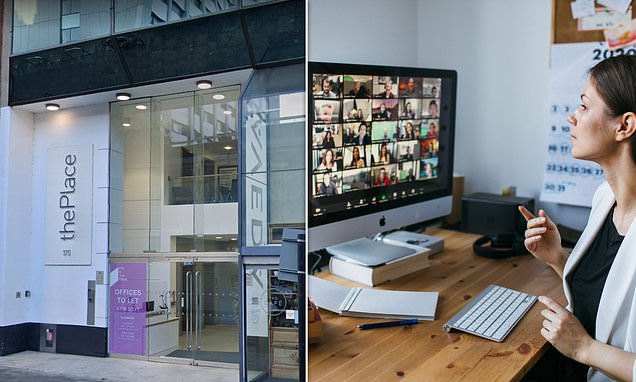Now even Zoom tells staff to get back to the office! Video calling company which became massive during pandemic ends WFH
- Zoom was the go-to platform for families during the coronavirus pandemic
- Staff near new London office will have to work in person TWICE a week
Zoom – the video calling company which became massive during the coronavirus pandemic when people were forced to work from home – has ordered its staff back to the office.
The company’s name became synonymous with households during the pandemic with families up and down the UK using it for quiz nights and to catch up with relatives.
But now the tech firm has told staff those who live within a 50-mile radius of an office should work in person at least TWICE a week.
Zoom’s new policy would put it in a ‘better position to use our own technologies, continue to innovate, and support our global customers’, reported the BBC.
The company has a workforce of between 5,000 and 10,000, according to its LinkedIn page, with around 200 working in its new UK office in London.
A spokesperson for the firm said: ‘We believe that a structured hybrid approach – meaning a set number of days employees that live near an office need to be on site – is most effective for Zoom.
‘As a company, we are in a better position to use our own technologies, continue to innovate, and support our global customers.
‘We’ll continue to leverage the entire Zoom platform to keep our employees and dispersed teams connected and working efficiently.’
Zoom only recently opened its new London office at The Place in High Holburn. Workers who live within a 50-mile radius of the office will have to work in person twice a week
Zoom was the go-to platform for businesses and families up and down the country during the pandemic. But now even the tech firm which saw its revenue rocket during Covid has changed its flexible working policy
The Californian-based company’s 14 offices are based across the globe, from San Jose in California and Denver in Colorado to London, Amsterdam and Karlsruhe in Europe.
Offices are also based in India, China, Japan, Singapore and Australia.
Zoom was the go-top platform for households during the pandemic as families used it to keep in touch with loved-ones they were banned from seeing.
The company’s revenue almost doubled after then prime minister Boris Johnson locked down England for the first time in a bid to stop the spread of the virus.
Zoom Video Communications Inc raised its full-year revenue forecast to between $1.78billion and $1.80billion at the time in June 2020.
This was up from between $905million and $915million which was forecasted before the worldwide pandemic struck.
Yet the company’s fortunes appear to have taken a hit when in February CEO Eric Yuan announced he would be laying off 1,300 workers and cutting his own $1.1million salary by 98 percent.
Mr Yuan posted the notice to employees on Zoom Blog, letting them know that those impacted by the layoffs received an email.
He said that his own salary would be cut down to $22,000 this year, and that other executives will also see their salaries trimmed by 20 percent, with all of them foregoing their 2023 annual bonuses.
Mr Yuan said the layoffs impacted every department in the company, and that fired employees are going to receive up to 16 weeks salary and healthcare coverage.
In his message to employees posted 30 minutes before the emails were sent out, Yuan wrote: ‘We have made the tough but necessary decision to reduce our team by approximately 15 percent and say goodbye to around 1,300 hardworking, talented colleagues.’
‘I know this is a difficult message to hear, and certainly not one I ever wanted to deliver.’
Zoom isn’t the only business which has told workers they must return to the office after a shift in culture during the coronavirus crisis.
In January, Disney CEO Bob Iger sent a memo to employees telling them the media giant had made a U-turn on its flexible working policy with a four-day return to the office from March, reported CNBC.
‘As you’ve heard me say many times, creativity is the heart and soul of who we are and what we do at Disney,’ he wrote.
‘And in a creative business like ours, nothing can replace the ability to connect, observe and create with peers that comes from being physically together, nor the opportunity to grow professionally by learning from leaders and mentors.’
Other businesses have followed suit, including Starbucks, Twitter, and Amazon.
Source: Read Full Article




